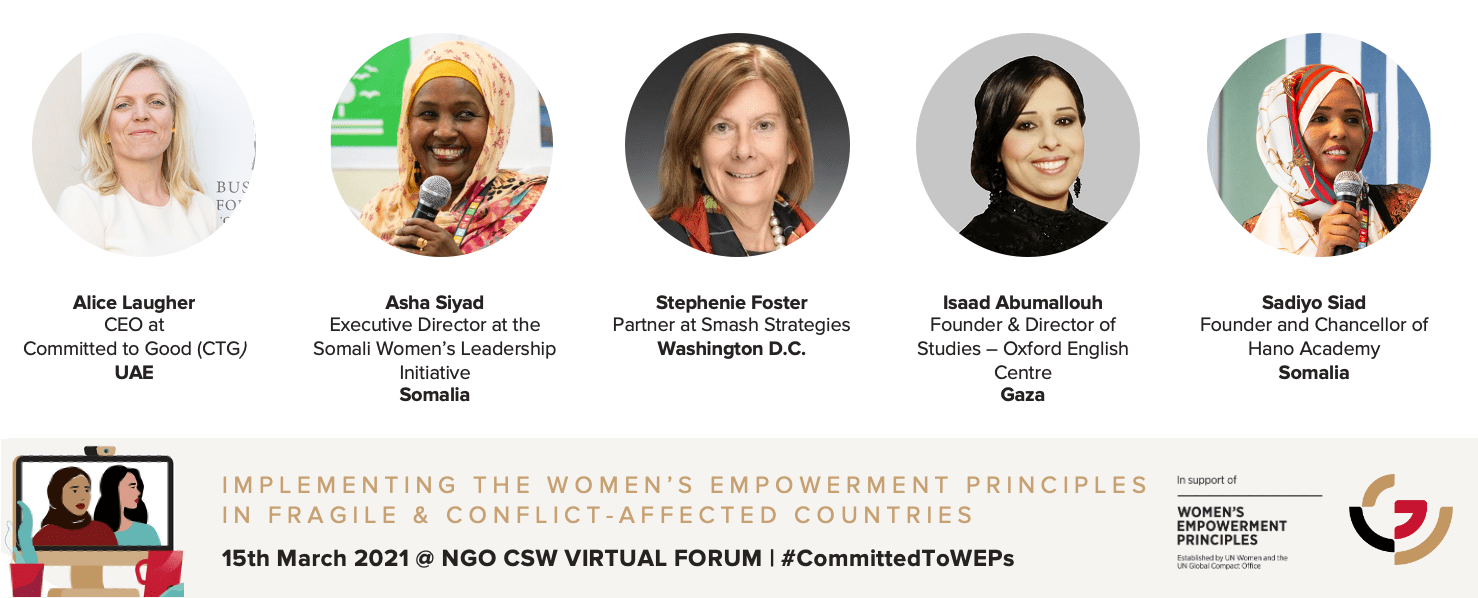The Women’s Empowerment Principles
CTG is a strong advocate for the Women’s Empowerment Principles, having been a signatory since 2017. Launched in collaboration between UN Women and the United Nations Global compact, the WEP’s 7 principles offer a straightforward road map that businesses can follow to take responsibility and ensure they leave no one behind. The WEPs formed the foundation of the CTG webinar, offering insights into how they can be effectively used to promote gender equality within the workplace, marketplace and community of fragile and conflict-affected countries. In doing so CTG hopes to inspire more organisations to recognise their value and make their own commitment to the principles, thus supporting progress to the Women, Peace and Security Agenda.
Empowering Women Through Economic Participation
Despite the many extreme challenges women face in fragile and conflict-affected countries, they continue to advocate for their rights and equal participation in public life. Women’s economic empowerment involves their ability to equally participate in economic markets, and offers a crucial step to promoting their independence. CTG webinar panellist Stephenie Foster explored her experience of working closely with the Afghan Chamber of Commerce and Industry. Helping women navigate the economic system and devise strategies on how to advocate for their economic empowerment in their government has brought about monumental changes to laws and provided them with more access to capital. This has built strong foundations for women’s entrepreneurship by allowing them to harness their skills and talents to build their own businesses, become profitable, and make substantial contributions to their country’s economy.
Setting Strong Foundations Through Education
Both panellists Isaad Abumallouh and Dr Sadiyo Siyad explored their experiences of how education has been transformational in promoting gender equality and women’s empowerment in Gaza and Somalia. In many conflict-affected countries, opportunities are limited and unemployment is rife, but a good education offers an effective means to improve access to decent employment and future opportunities. In Gaza Isaad Abumallouh shared that learning the English language not only triples your chances of securing decent work, but can also triple your income potential. Both panellists identified gaps in their respective education markets and have founded educational institutions to meet the needs of their local communities. From teaching English language, to technical and vocational courses, both institutions are committed to offering substantial contributions to their countries’ long term development by allowing individuals, especially women, to forge their own prosperous futures.
“If there’s no seat at the table for you, bring your own chair. It’s time for women to have a voice and to have an opportunity to be invested in” Dr Sadiyo Siyad, Chancellor, Hano Academy
Boosting Women’s Political Inclusion and Participation
In Somalia, women face many challenges related to structural discrimination that are exacerbated by cultural, traditional and religious practices, as well as the onset of crisis, disaster and conflict. Not long ago, women were excluded from the Somali parliament and governmental institutions. Our panellist Asha Abdulle Siyad played a key role in changing this through her organisation, the Somali Women’s Leadership Initiative, and lobbying for women’s participation. Having trained many women in topics such as advocacy, mediation, and conflict resolution and witnessed their subsequent movement into political positions, Asha stands firm in her belief of the importance of equipping women with skills and knowledge, and how doing so paves the path for them to succeed, not just for themselves but for the future generations of Somali women.
What’s next?
CTG was proud to host such an inspiring panel of speakers, all of whom are pioneers and entrepreneurs changing the future of their nations; look out for their future webinars. To watch the recording of this CTG webinar press here, and to learn more about the WEPs and why CTG has signed, press here.

